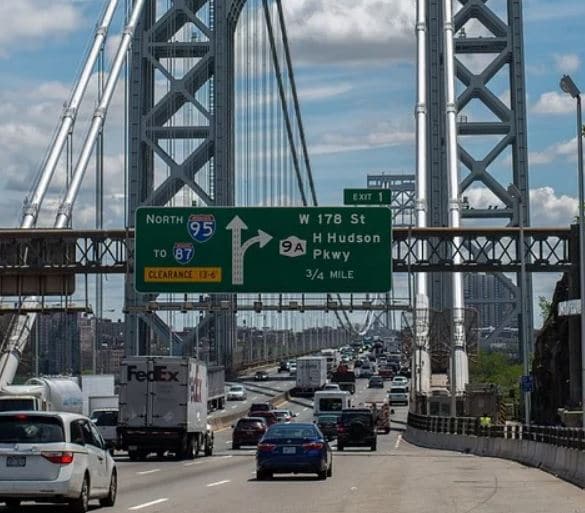Justices Appear Troubled by New Jersey ‘Bridgegate’ Convictions

WASHINGTON – The Supreme Court signaled Tuesday that the government may have overreached when it prosecuted two ex-New Jersey officials for their involvement in the “Bridgegate” scandal.
For those who don’t remember, Bridgegate, also known as the George Washington Bridge lane closure scandal, stemmed from the abrupt closure on September 9, 2013, of two of three toll lanes at the local street entrance of the bridge in Fort Lee, New Jersey, during the morning rush hour.
The lanes remained closed for a week before the Port Authority of New York and New Jersey intervened.
A fictitious traffic study was used as cover for the change, but prosecutors said the real motive was political payback.
It was later determined that a staff member and political appointees of then-New Jersey Gov. Chris Christie, colluded to create the traffic jams to punish Fort Lee’s mayor for refusing to endorse Christie’s re-election.
Bridget Kelly and Bill Baroni were later convicted of fraud and conspiracy in connection with the scheme.
But on Tuesday morning, at least six of the justices suggested at one time or another during oral argument they were troubled by the prosecution.
The arguments before the high court on Tuesday did not focus on whether Kelly or Baroni participated in the traffic scheme.
The question considered was simply whether under the statute, a public official can defraud the government of its property by advancing a public policy reason for a decision that was “not their subjective real reason for making the decision.”
Chief Justice John Roberts noted that despite the fact that Kelly and Baroni worked to create gridlock by reducing the number of bridge toll lanes reserved for Fort Lee traffic from three to one, the formerly reserved lanes were open to other traffic and therefore “still being used for public purposes.”
But Eric Feigin, who argued the case for the Justice Department’s Office of the Solicitor General, maintained Kelly and Baroni’s actions in the case were fraud “in just the same way that it would be fraud for someone with no connection to the Port Authority to impersonate Port Authority supervisors and order Port Authority employees to realign Port Authority lanes.”
“I don’t see how this case works,” Justice Stephen Breyer said.
Though he allowed what happened at the bridge was not a good thing, he questioned if it was a crime.
“They don’t get a free pass simply because Baroni worked for the Port Authority when the evidence showed that he didn’t have the power to direct these resources in this way without telling the lie,” Feigin told the justices. “And they don’t get a free pass simply because their motive happened to be political.”
But Justice Samuel Alito, who was born in Trenton, New Jersey and was the top federal prosecutor in the state before becoming a judge, suggested he was troubled by the government’s argument that Baroni was not authorized to make changes to the bridge access lanes.
“I’ve read these jury instructions several times. There’s nothing in there that would alert a jury, a juror, to the obligation to find that Baroni was unauthorized,” Alito said.
Kelly was weeks from beginning a 13-month sentence last year when the Supreme Court agreed to hear the case. Baroni had begun serving his 18-month sentence but was released from prison after the high court agreed to weigh in.
Both, now free on bail, were present for Tuesday’s arguments, as was Christie, who has long denied knowing about the plan as it was unfolding.






















